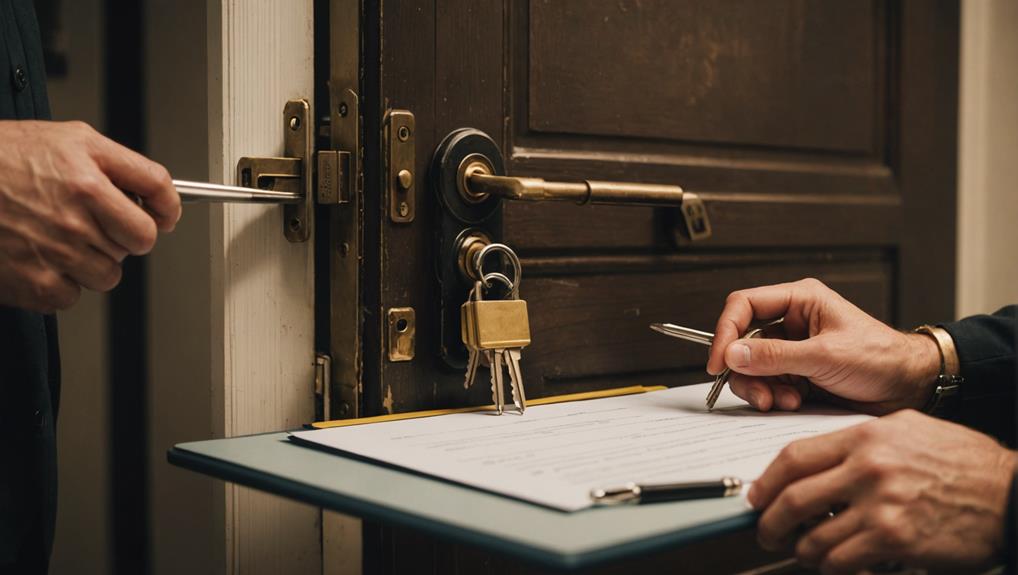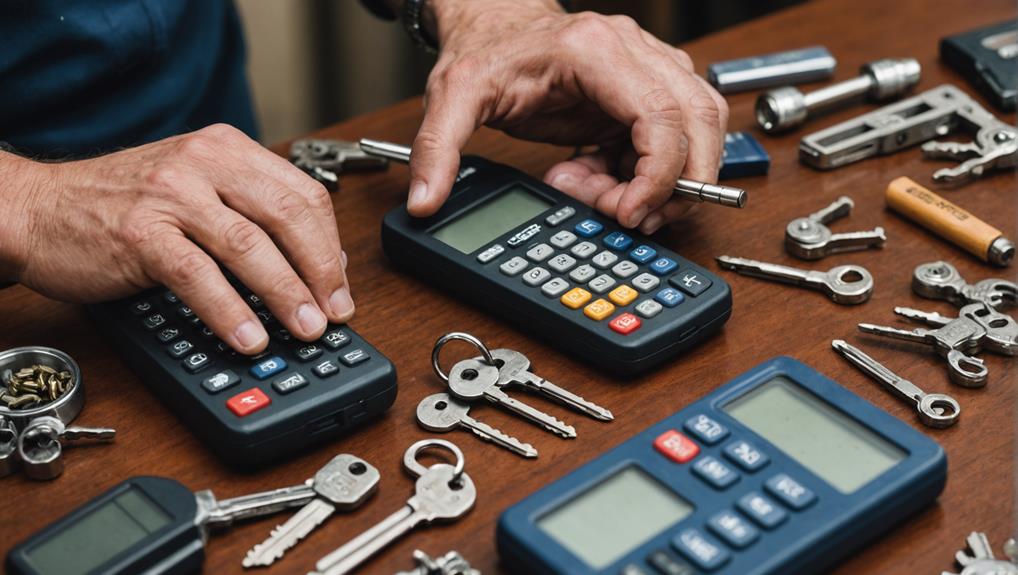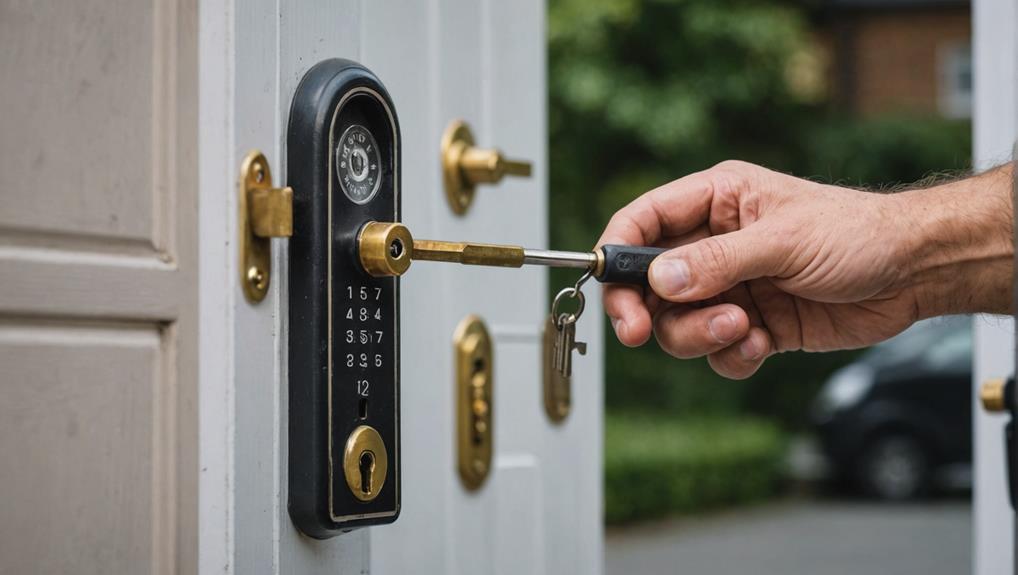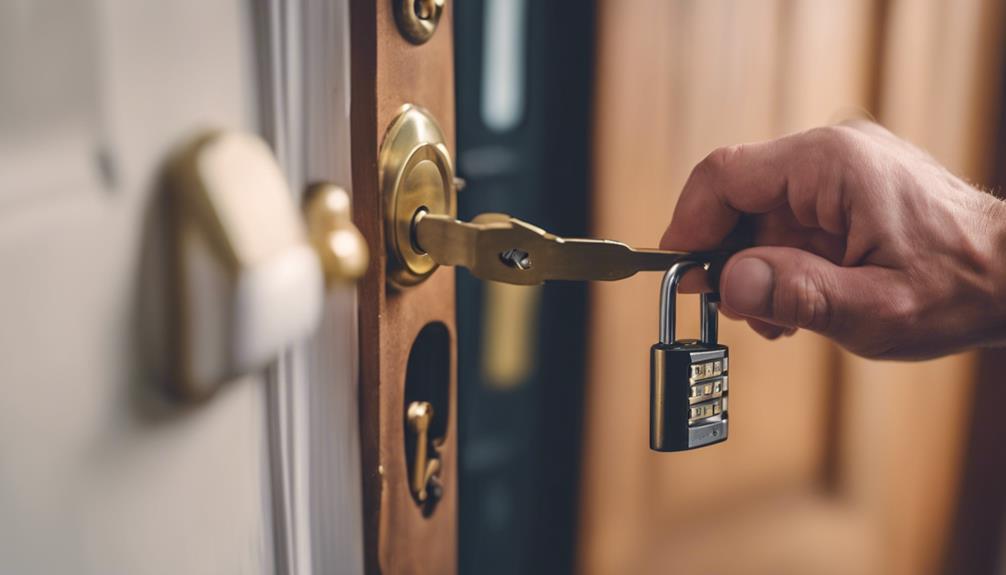Insurance coverage for lock re-keying can save you money in certain situations. If you experience a break-in, lose your keys, or just move into a new home, your policy might cover re-keying costs. Homeowners insurance often includes this feature, while renters policies usually don't. To file a claim, gather your documents, contact your provider, and explain your situation clearly. Keep in mind that costs vary based on lock type and number of locks needing attention. Understanding your coverage helps you make informed decisions about securing your property. There's much more to explore on this important topic.
Key Takeaways
- Homeowners insurance typically covers re-keying costs after break-ins or if keys are lost and security is compromised.
- Renters insurance generally excludes lock re-keying, focusing primarily on personal property coverage.
- Landlord insurance may cover re-keying when tenants vacate or following a security breach.
- It's essential to review policy details and consult with agents to understand specific re-keying coverage.
- Documenting incidents and expenses strengthens claims for re-keying under applicable insurance policies.
Scenarios for Insurance Coverage
When you find yourself in a situation where you need to re-key your locks, understanding your insurance coverage can be essential. Many homeowners don't realize that specific scenarios may qualify for an insurance claim rekeying. For instance, if your home has been broken into or if you've lost your keys, your policy might cover the cost of re-keying.
Additionally, it's important for both landlords and tenants to be aware of the legal aspects surrounding re-keying, as it can affect your insurance claims and responsibilities legal implications of re-keying.
Moreover, if you've recently moved into a new home, it's advisable to re-key the locks for security reasons. In some cases, your insurance may reimburse you for this expense, especially if it's part of a broader loss prevention strategy.
Additionally, if your locks are damaged due to vandalism or a natural disaster, you could also find yourself eligible for coverage. Always keep in mind that documenting the situation can bolster your claim.
Before proceeding with any re-keying, review your insurance policy carefully and consult your agent. They can clarify what's covered and guide you through the claims process.
Taking these proactive steps helps guarantee that you not only serve your security needs but also navigate the financial aspects effectively.
Types of Insurance Policies

Understanding the different types of insurance policies is essential for homeowners, especially when it comes to situations like re-keying locks. Knowing which policy covers lock rekeying can save you both time and money.
It's also important to understand your landlord's responsibilities regarding lock replacement, as this can influence your insurance needs landlord responsibilities.
Here are some common types of insurance policies to evaluate:
- Homeowners Insurance: This is the most common policy, covering various risks, including theft and vandalism. Depending on the policy, re-keying might be included after a break-in.
- Renters Insurance: If you're renting, this policy typically covers personal property but may not cover lock rekeying. Check with your provider for specifics.
- Landlord Insurance: If you're a landlord, your policy may cover re-keying expenses when a tenant moves out or after a security breach.
- Comprehensive Insurance: This broader policy often includes various risks and may cover lock rekeying as part of a home security upgrade.
Knowing the nuances of these policies can help you better serve your home's security needs.
Always read the fine print and think about consulting with an insurance agent to guarantee you have the right coverage for lock rekeying.
How to File a Claim

If you've determined that your insurance policy covers re-keying locks, the next step is knowing how to file a claim. Start by gathering all necessary documents, including your policy details and any police reports if a break-in occurred. This will help support your claim for rekeying after break-in insurance.
Remember, re-keying your locks can greatly enhance your home's security following an unauthorized entry, making it a wise decision in such situations. For insights on the importance of re-keying, refer to the essential guide to re-keying your home locks.
Next, contact your insurance provider. You can usually find their claims department number on your policy documents or their website. When you call, be clear and concise about your situation. Explain that you need coverage for rekeying locks due to a break-in, and provide any relevant information they request.
After your initial call, follow up with any required paperwork. Some insurers may ask for estimates from locksmiths or receipts for services rendered.
Keep track of all communication with your insurer, documenting dates, times, and the names of representatives you speak with.
Costs Associated With Rekeying

Rekeying your locks can vary in cost depending on several factors, including the type of locks you have and the locksmith's pricing.
Understanding the costs involved helps you budget effectively and leverage lock rekeying insurance if needed. For instance, understanding lock rekeying costs can provide insights into whether a DIY approach or hiring a professional is more cost-effective.
Here are some key factors to take into account:
- Type of Locks: Standard pin tumbler locks are usually cheaper to rekey than high-security locks, which require specialized tools.
- Number of Locks: If you're rekeying multiple locks, some locksmiths may offer a discount for bulk services.
- Service Call Fees: Many locksmiths charge for travel time, so if you live in a remote area, that could increase costs.
- Time of Service: Emergency services, especially after hours, typically come with a higher price tag.
Tips for Preventing Future Issues

To avoid future lock issues, consider implementing a few proactive measures that can save you time and money down the road. First, regularly inspect your locks for any signs of wear or damage; this helps identify potential vulnerabilities early on. If you notice anything unusual, address it immediately to prevent further complications.
Regular maintenance can also lead to a better understanding of when lock re-keying is beneficial.
Next, keep spare keys secure but accessible. This prevents lockouts and minimizes the need for rekeying. Speaking of rekeying, it's wise to know your insurance policy. Understand whether your policy covers rekeying; this information can help you make informed decisions if you ever find yourself needing it.
Additionally, always make certain your home's entry points are well-lit and free of obstructions. This deters potential break-ins and guarantees you can access your locks easily.
Frequently Asked Questions
Does Insurance Cover Rekeying for Lost Keys?
When you lose your keys, you might wonder if insurance covers rekeying.
It really depends on your policy and provider. Some homeowners or renters insurance might include this type of coverage, while others don't. Checking your specific policy details can help clarify what's included.
If it's not covered, you can still take steps to secure your home by rekeying, ensuring your safety without stressing over the costs.
Always stay informed about your options!
Are There Specific Exclusions for Rekeying in Policies?
Many people don't realize that around 30% of homeowners' insurance policies have specific exclusions that may affect rekeying services.
When you're looking into your policy, it's essential to read the fine print. Some policies might exclude rekeying due to negligence or lack of maintenance.
Always check with your insurer to clarify these details, ensuring you're fully prepared to serve your security needs without unexpected surprises when you need assistance the most.
How Often Can I Rekey My Locks Under Coverage?
You can rekey your locks as often as you feel it's necessary for your security.
There's no universal limit on how frequently you should do it, but consider timing it with changes in your living situation or if you've lost a key.
Regularly evaluating your security helps protect yourself and your loved ones.
Just remember to keep documentation of each rekeying to guarantee you're covered in case of any future issues.
Will My Deductible Affect the Rekeying Claim?
Yes, your deductible will affect the rekeying claim.
If the cost of rekeying is less than or close to your deductible, it mightn't be worth filing a claim. You'll end up paying out of pocket anyway.
On the other hand, if the expenses exceed your deductible, filing could be beneficial.
Always assess your situation and compare costs before deciding whether to submit a claim or handle the rekeying yourself.
Can I Choose My Locksmith for Rekeying Services?
Yes, you can choose your locksmith for rekeying services.
It's important to find a professional you trust who can do the job right.
Make certain to check their credentials and reviews to guarantee they're reliable.
Remember, your peace of mind matters, so take the time to select someone who understands your needs.
You deserve a locksmith who'll prioritize your security and provide excellent service throughout the process.
Conclusion
In the grand garden of homeownership, securing your castle isn't just about strong walls but also about the keys that open them. Just as a wise gardener checks for weeds, you should explore your insurance coverage for rekeying. By understanding your policy, you're not just nurturing your space; you're planting seeds of peace of mind. So, as you tend to your home, remember: it's not just about keeping intruders out, but creating a sanctuary where you feel safe.









